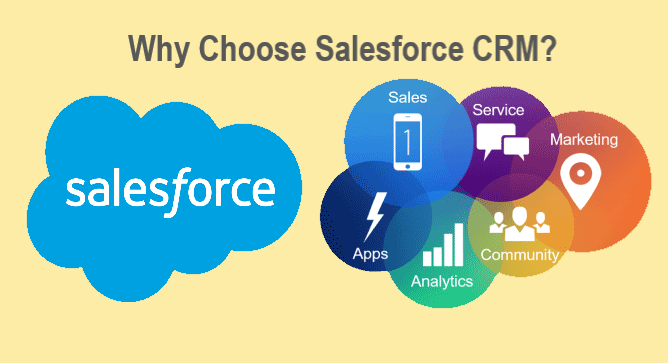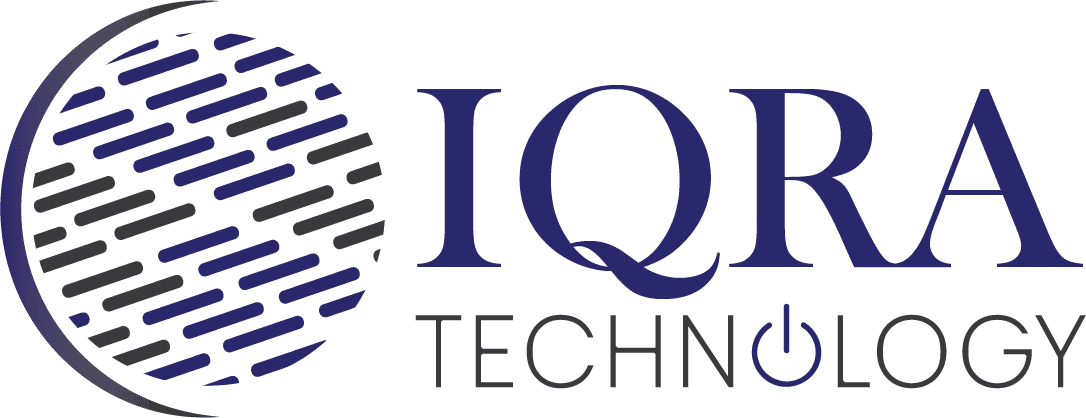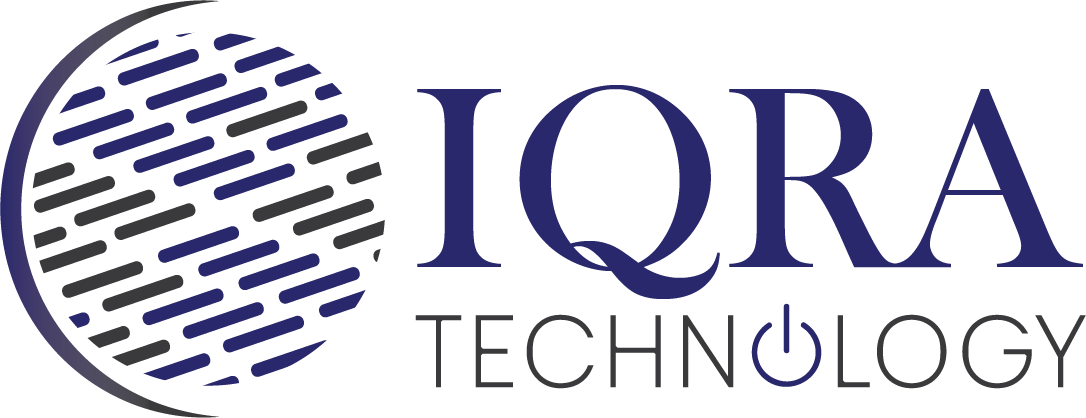Why Choose Salesforce CRM?

Here, is the answer For that, we just need to know what does it mean by CRM, how it works with Salesforce and the types of CRM. For whom it is beneficial and how it could be beneficial for you to choose it.
What is CRM and Salesforce CRM:
Customer relationship management (CRM) is a technology for managing and arranging all the company’s relationships and interactions with customers or consumers.
The basic goal of CRM is to improve the relationships of your business with the customer or stakeholders.
TYPES OF CRM SOFTWARE:
Generally, there are four types of CRM software are there.
Those are as follows:
A. Analytical CRM
B. Operational CRM
C. Collaborative CRM
D. Marketing CRM
These are explained in detail below:
A. Analytical CRM:
Features of Analytical CRM Software :
These are some features commonly found in analytical CRM software:
1. Data Warehousing: A database that is easy to search and retrieve data for reporting.
2. Mining of Data: It Helps make sense of the behavior of customers by finding meaningful patterns of data.
3. Forecasting: it Uses tools like machine learning to forecast sales and other important metrics for decision making.
4. Online Analytical Processing (OLAP): It is a Multidimensional data that is flexible enough for observation or small-scale analysis of data.
Who Should Use Analytical CRM Software:
These CRMs are useful for larger sales teams needing tons of data for generating the leads.
Also, data-heavy industries like banking and real estate will benefit from an analytical CRM’s data mining tools to forecast future results and outcomes.
Here’s who can benefit the most from using analytical CRM software:
1. Sales Teams who Need to Forecast deals to crack it.
2. Customer Support Teams who Want to Improve their services.
3. Marketing Teams who are Trying to Reach New Leads.
4. Sales Managers who are Monitoring Progress.
Top Analytical CRM Software:
Here are three of the best analytical CRM software providers. those are as follows:
1. HubSpot CRM: it is for analyzing customer interactions and marketing campaigns.
2. Zoho CRM: it is for visualizing lead analytics, particularly for social media outreach.
3. Infor CRM: it is for electronic-commerce sites that want to merge their front and back office.
B. Operational CRM:
Operational CRM software supports sales, service, marketing, and back-office teams by automating the day-to-day operations of the business.
Features of Operational CRM Software :
These are some features commonly found in Operational CRM software:
1. Automation of Workflow: It helps to save time by having the CRM automate sales, service, marketing, and back-office tasks.
2. Generation of leads: It helps to Manage lead generating tasks and engage with leads via email or live chat to collect information and keep them interested until they’re ready to buy or it has been converted into a lead.
3. Automation of Marketing Campaigns: It helps Set up triggers to launch email and social media campaigns at optimal times and cost.
4. Management of Project: It also helps to Manage the post-sale relationship and invoice clients on regular basis.
Who Should Use Operational CRM Software:
It helps sales teams spend less time on non-revenue-generating tasks and spent more time on lead generation tasks.
Here’s who can benefit from operational CRM software:
1. Those Needing Customer Lifecycle Management
2. Sales Teams Needing Automations
3. Marketing Teams Generating Automated Leads
4. Sales Reps Logging Interactions
Top Operational CRM Software:
Here are three of the best Operational CRM software providers. those are as follows:
1. Agile CRM: It is Best for call centers because of its native two-way telephony services.
2. Zoho CRM: It is Best for using social media to generate leads and engage with customers
3. Pipedrive: It is Best for creating an all-in-one operations hub via the app of integrations.
C. Collaborative CRM:
Collaborative CRM software is used for team-based environments where multiple departments are there. those who share data or interact with the same customers at various or at the same time. it facilitates communication and collaboration across multiple departments by collecting, sharing, and organizing, customer data.
Features of Collaborative CRM Software:
These are some features commonly found in Collaborative CRM software:
1. Centralized Data: It is used to Customer information and project statuses are available for all in the company to see and update.
2. Tracking of Activity: It is used for Logging conversations and interactions with customers and makes it easier to hand off cases to other employees when needed.
3. Tools for Communication: It Offers an internal network with shared messaging and internal message boards.
4. Management of Document: It Creates and stores collateral and other essential documents that can be edited, approved, and shared by team members.
5. Compatibility of Cross-Platform: It helps Companion phone apps make information accessible for mobile teams.
Who Should Use Collaborative CRM Software:
Collaborative CRM software is good for team-based environments where multiple departments share data or interact with the same customers at the same time or at different times.
The following teams should use collaborative CRM:
1. Sales Teams Sharing Leads.
2. Customer Success Teams.
3. Marketing Teams Generate Leads.
Top Collaborative CRM Software:
Here are three of the best Collaborative CRM software providers. those are as follows:
1. Dynamics 365 Sales: It is Best for teams that are connected with the Microsoft ecosystem.
2. Insightly: It is Best for salespeople who need access to a CRM while out on the road.
3. SAP Business One: It is Best for businesses that use SAP for enterprise resource planning.
D. Marketing CRM:
Marketing CRM software helps businesses generate and create online leads through automation and task management.
Features of Marketing CRM Software :
These are some features commonly found in Marketing CRM software:
1. Email Marketing Builder: It helps to capture leads, build email databases and automate email drip campaigns as part of your marketing funnel.
2. Email & Web Templates: It provides Pre-made, customizable templates that make it easy to create emails and web pages without any design background.
3. Integration of Social Media: It Manages organic and paid social media efforts directly from the marketing CRM.
4. Marketing Analytics: It also helps to track email opens, and social media activity, and see where website visitors are most likely to click.
Who Should Use Marketing CRM Software:
Marketing CRM software is essential and necessary for sales and marketing teams of any size that want to launch successful inbound campaigns.
Here’s who can use marketing CRM software:
Email Marketers who are Creating Drip Campaigns
Social Media Marketers who are Generating Leads
Inbound Marketers who are Capturing Website Visitors
Top Operational CRM Software:
Here are three of the best Operational CRM software providers.
those are as follows:
Zoho CRM: It is Best for marketing teams that need robust social media integrations.
Pipedrive: It is Best for businesses that want a simple-to-follow visual marketing pipeline.
Mailchimp CRM: It is Best for launching effective inbound email marketing campaigns.
What does Salesforce CRM do:
It brings customers and companies together.
Salesforce unites marketing, sales, commerce, service, IT, and other teams from anywhere with Customers.
There are five major advantages of salesforce CRM are as follows:
1. Cross-functional insight and reporting of customers in a single view.
2. Visual showcase of data.
3. Customer-centric automation
4. Proactive service
5. Easy collaboration
These are explained in detail below:
1. Cross-functional insight and reporting of customers in a single view:
Salesforce CRM in the company can be designed to maintain clean data, it is used to collect, organize, and customize data in a report for department needs.
2. Visual showcase of data:
It provides A setup of the customized dashboard in the Salesforce CRM platform that lets users quickly see the data that’s most important to their workflows without having to dig, sort, or run a report.
3. Customer-centric automation:
We can say that salesforce CRM is customer-centric Because one can continually capture the data about and insights into audience, market, and industry, and one can create more relevant, personalized messaging and outreach to the unique needs of each customer.
4. Proactive service:
It can also improve a sales team’s efforts to manage relationships with the customers. if the sales team knows customer interest then they can easily meet the customer’s needs and solve problems more proactively.
5. Easy collaboration:
Some CRM platforms have built-in collaboration and communication tools that allow many people to work on one file simultaneously that allowing faster response times to customer requests.
Now the final answer that attracts you to choose salesforce CRM:
1. world’s top customer relationship management (CRM) platform is a Salesforce
2. which helps your sales, marketing, commerce, service, IT, and other teams work as one from anywhere
3. with the help of which you can keep your customers happy all over or worldwide.
4. it Improves business relationships. And helps companies stay connected to customers, and improves profitability.


